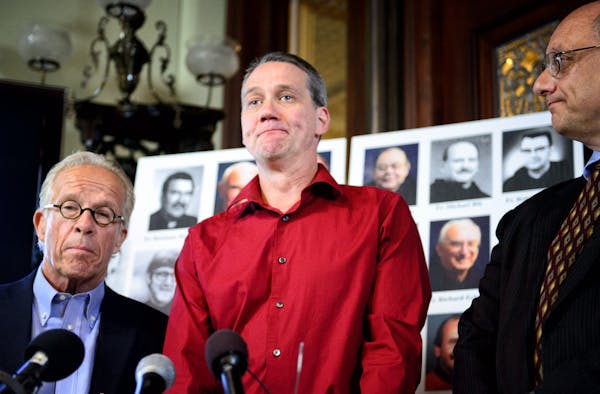The 187 Roman Catholic parishes in the Archdiocese of St. Paul and Minneapolis will have a greater voice in the church's bankruptcy proceedings as the result of a court ruling Thursday.
U.S. Bankruptcy Judge Robert Kressel said the court will appoint a creditors committee representing parishes that will participate in mediation sessions forging financial settlements and archdiocese reorganization plans.
Parishes aren't adequately represented by the official creditors committee, which is composed of five clergy abuse survivors, said Mary Jo Jensen-Carter, an attorney representing 118 parishes. Parishes have significant claims against the archdiocese, including up to $17 million in overpayments to its insurance funds and liabilities from clergy abuse by priests appointed by the archdiocese, she said.
Rob Kugler, the attorney representing the creditors committee, argued that it would be a conflict of interest for parishes to have a creditors committee because they are an arm of the archdiocese. The archbishop and vicar general, for example, serve on all of the parishes' five-member boards of directors.
Jensen-Carter said the archbishop and vicar general would recuse themselves on all matters related to the archdiocese bankruptcy, filed in January.
Such a parish creditors committee may be the first in the nation. Although a dozen dioceses and archdioceses have filed for bankruptcy in recent years, parish creditors are generally addressed through a "parish group" rather than with the official status of a creditors committee, attorneys said.
Kressel said he expects the parish committee to "speak for itself."
"It's another voice in the case," said Kressel. "I don't see the parishes as automatic allies … of the archdiocese."
After the ruling, Kressel asked the archdiocese for an update on the public notices it is placing in 30-some newspapers and other media outlets informing clergy abuse victims of their Aug. 3 deadline for filing a claim against the archdiocese.
Archdiocese attorney Richard Anderson told Kressel that the public notices ran in the legal and classified-ad sections of the newspapers, which is how other dioceses have handled it. Kressel scolded the attorney, saying the public notices need to be far more visible.
"Nobody reads legal notices," said Kressel. "That's not going to notify anyone. If that's what you're doing, that needs to change."
Unique position
A creditors committee of about five parish delegates could be appointed as soon as next week by the U.S. trustee, Carter-Jensen said.
Attorneys on both sides agreed that parishes hold an unusual position in the archdiocese bankruptcy case, but for different reasons. The parishes are spread over 12 metro counties and serve an estimated 825,000 Catholics.
"The parishes are in a unique position," wrote Jensen-Carter in a court document. "They are creditors having claims against the [archdiocese's] health insurance fund, the liability insurance fund and ... contributions for any payments to the clergy abuse creditors.
"The parishes, through the contributions of their parishioners, also provide financial support to the debtor through their assessments," it said.
Parishes are creditors in this bankruptcy equation for several reasons, said Jensen-Carter. They overpaid about $17 million in premiums to the archdiocese general insurance fund, and its medical and dental plan, over the years. Parishes want to protect the fund, "to make sure it remains there."
Parishes also will file indemnity claims, she said.
"To the extent a priest was placed there by the archdiocese, our position is the parish would have a claim against the archdiocese for any amount they would have to pay [for a settlement]," she said.
Some churches suffered direct financial losses, such as St. Anne-St. Joseph Hien of Minneapolis, which is owed nearly $500,000 in connection with the archdiocese's interparish loan fund.
Having official status as a creditors committee also means that attorneys' fees for parishes would be paid as an administrative expense of the bankruptcy, as opposed to churches paying directly, Carter-Jensen said.
Kugler objected to the archdiocese's estate being used to pay for more attorneys' fees. If a key goal of the bankruptcy settlement process is to compensate victims of clergy abuse, appointing a parish committee complicates the matter, he argued.
Archdiocese attorney Anderson said the archdiocese supported a parish creditors committee "to enhance the odds that parishes will speak with one voice."
Victims' attorney Jeff Anderson said the committee "makes practical sense."
But Anderson, whose law firm had developed a working relationship with the archdiocese in the bankruptcy process, expressed outrage over the size and placement of the archdiocese's public notices to alert abuse victims.
"Today was a backward step on the bridge that was being built," Anderson said.
Jean Hopfensperger • 612-673-4511

Trail section at one of Minnesota's most iconic spots closing for rehab

Will 'shotgun only' zone for deer in southern Minnesota be abolished?

Four Minnesotans catch salmonella in outbreak linked to basil sold at Trader Joe's

